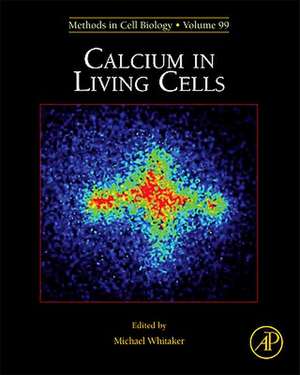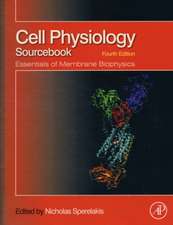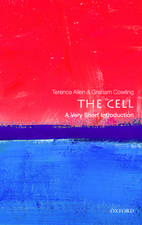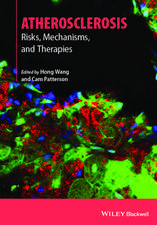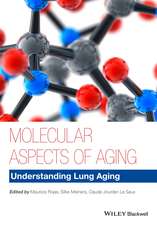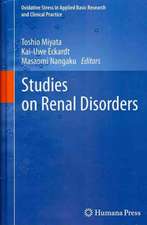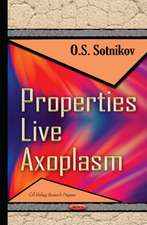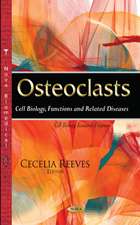Calcium in Living Cells: Methods in Cell Biology, cartea 99
Michael Whitakeren Limba Engleză Hardback – 25 noi 2010
- Gives researchers much needed information on how to study calcium in live cells, which is becoming increasingly important in heart, musculoskeletal, and immune system research
- Provides an overview of the latest methods--fluorescence resonance energy transfer (FRET), for example-- that are new to the field
- Allows understanding of how calcium plays a role in intracellular function at the cellular level, which has proved important in Alzheimer's research, heart disease, and areas of musculoskeletal research
- Updated chapters reflect advancements in the classic techniques used'preparing calcium buffers, vibrating the Ca2+ Electrode and confocal imaging
Din seria Methods in Cell Biology
- 31%
 Preț: 702.75 lei
Preț: 702.75 lei - 31%
 Preț: 737.25 lei
Preț: 737.25 lei - 9%
 Preț: 734.41 lei
Preț: 734.41 lei - 31%
 Preț: 696.19 lei
Preț: 696.19 lei - 31%
 Preț: 695.58 lei
Preț: 695.58 lei - 32%
 Preț: 694.90 lei
Preț: 694.90 lei - 27%
 Preț: 702.22 lei
Preț: 702.22 lei - 24%
 Preț: 685.52 lei
Preț: 685.52 lei - 9%
 Preț: 621.87 lei
Preț: 621.87 lei - 31%
 Preț: 704.39 lei
Preț: 704.39 lei - 27%
 Preț: 745.66 lei
Preț: 745.66 lei - 31%
 Preț: 699.50 lei
Preț: 699.50 lei - 31%
 Preț: 703.51 lei
Preț: 703.51 lei - 27%
 Preț: 700.08 lei
Preț: 700.08 lei - 31%
 Preț: 706.55 lei
Preț: 706.55 lei - 23%
 Preț: 698.33 lei
Preț: 698.33 lei - 31%
 Preț: 700.08 lei
Preț: 700.08 lei - 31%
 Preț: 699.23 lei
Preț: 699.23 lei - 31%
 Preț: 749.64 lei
Preț: 749.64 lei - 31%
 Preț: 747.89 lei
Preț: 747.89 lei - 32%
 Preț: 741.01 lei
Preț: 741.01 lei - 9%
 Preț: 746.61 lei
Preț: 746.61 lei - 28%
 Preț: 697.85 lei
Preț: 697.85 lei - 31%
 Preț: 742.72 lei
Preț: 742.72 lei - 28%
 Preț: 700.51 lei
Preț: 700.51 lei - 32%
 Preț: 812.63 lei
Preț: 812.63 lei - 31%
 Preț: 818.59 lei
Preț: 818.59 lei - 32%
 Preț: 815.13 lei
Preț: 815.13 lei - 32%
 Preț: 811.43 lei
Preț: 811.43 lei - 32%
 Preț: 811.16 lei
Preț: 811.16 lei - 32%
 Preț: 790.48 lei
Preț: 790.48 lei - 9%
 Preț: 818.84 lei
Preț: 818.84 lei - 31%
 Preț: 820.31 lei
Preț: 820.31 lei - 33%
 Preț: 800.96 lei
Preț: 800.96 lei - 33%
 Preț: 800.70 lei
Preț: 800.70 lei - 32%
 Preț: 810.82 lei
Preț: 810.82 lei - 39%
 Preț: 810.62 lei
Preț: 810.62 lei - 29%
 Preț: 802.50 lei
Preț: 802.50 lei - 33%
 Preț: 799.66 lei
Preț: 799.66 lei - 33%
 Preț: 797.41 lei
Preț: 797.41 lei - 39%
 Preț: 801.98 lei
Preț: 801.98 lei - 39%
 Preț: 805.96 lei
Preț: 805.96 lei - 28%
 Preț: 814.11 lei
Preț: 814.11 lei - 28%
 Preț: 817.11 lei
Preț: 817.11 lei
Preț: 733.13 lei
Preț vechi: 1073.16 lei
-32% Nou
Puncte Express: 1100
Preț estimativ în valută:
140.30€ • 145.94$ • 115.83£
140.30€ • 145.94$ • 115.83£
Carte tipărită la comandă
Livrare economică 07-21 aprilie
Preluare comenzi: 021 569.72.76
Specificații
ISBN-13: 9780123748416
ISBN-10: 0123748410
Pagini: 328
Dimensiuni: 191 x 235 x 18 mm
Greutate: 0.77 kg
Ediția:2
Editura: ELSEVIER SCIENCE
Seria Methods in Cell Biology
ISBN-10: 0123748410
Pagini: 328
Dimensiuni: 191 x 235 x 18 mm
Greutate: 0.77 kg
Ediția:2
Editura: ELSEVIER SCIENCE
Seria Methods in Cell Biology
Public țintă
Researchers in cell, molecular and developmental biology, biochemistsCuprins
- A Practical Guide to the Preparation of Ca2+ Buffers
Donald M. Bers, Chris W. Patton and Richard Nuccitelli - Photorelease Techniques for Raising or Lowering Intracellular Ca2+
Robert Zucker - Making and Using Calcium-Selective Mini- and Microelectrodes
L. Hove-Madsen, S. Baudet and D.M. Bers - Construction, Theory and Practical Considerations for using Self-Referencing of Ca2+-Selective Microelectrodes for Monitoring Extracellular Ca2+ Gradients
Mark A. Messerli and Peter J.S. Smith - Practical Aspects of Measuring Intracellular Calcium Signals with Fluorescent Indicators
Joseph P. Y. Kao, Gong Li, Darryl A. Auston - Genetically-encoded probes for measurement of intracellular calcium
Michael Whitaker - Patch clamp methods for studying calcium channels
David L. Armstrong, Christian Erxleben and Jody A. White - Nuclear Patch-Clamp Recording from Inositol 1,4,5-Trisphosphate Receptors
Taufiq Rahman, Colin W. Taylor - Confocal And Multiphoton Imaging Of Intracellular Ca2+
Godfrey Smith, Martyn Reynolds, Francis Burto1, Ole Johan Kemi - The Use of Aequorins to Record and Visualize Ca2+ Dynamics: From Subcellular Microdomains to Whole Organisms.
Sarah E. Webb, Kelly L. Rogers, Eric Karplus, and Andrew L. Miller
Recenzii
Praise for the first edition:
"This multiauthored book... provides theoretical and applied aspects of different established techniques for the measurement of [Ca2+]i at submicromolar concentration. Each chapter is organized, keeping in view the needs of a person working in the laboratory, by giving the detailed methodology required for the implementation of that particular technique, and all the chapters are well referenced...The book provides a pragmatic approach for the estimation of cytosolic [Ca2+]i and also provides a means for studying the spatial and temporal resolution of [Ca2+]i. The book achieves the stated goal in the preface, 'this material will be very useful to the investigator who wants to apply any of these methods to his or her research." --RAMESH BHALLA, University of Iowa, Iowa City (published in MOLECULAR & CELLULAR NEUROSCIENCES)
"This multiauthored book... provides theoretical and applied aspects of different established techniques for the measurement of [Ca2+]i at submicromolar concentration. Each chapter is organized, keeping in view the needs of a person working in the laboratory, by giving the detailed methodology required for the implementation of that particular technique, and all the chapters are well referenced...The book provides a pragmatic approach for the estimation of cytosolic [Ca2+]i and also provides a means for studying the spatial and temporal resolution of [Ca2+]i. The book achieves the stated goal in the preface, 'this material will be very useful to the investigator who wants to apply any of these methods to his or her research." --RAMESH BHALLA, University of Iowa, Iowa City (published in MOLECULAR & CELLULAR NEUROSCIENCES)
